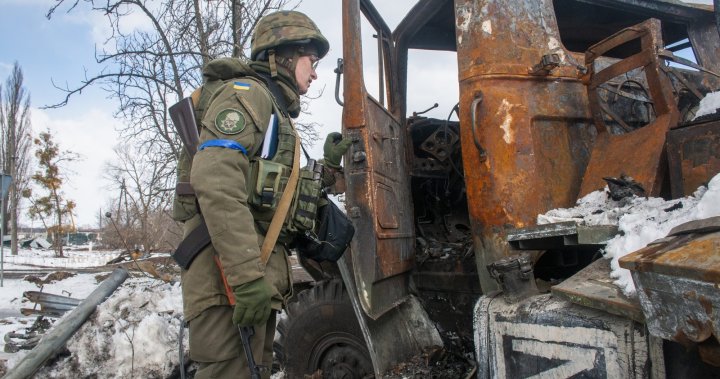
West shifting from sanctions to Ukrainian military aid as war intensifies: experts
Global News
Experts say the few hard-hitting sanctions remaining for NATO leaders to consider next week are not feasible, leaving military aid as a better strategy.
As the war in Ukraine becomes increasingly brutal, with Russian attacks killing and displacing civilians, experts say the international community is shifting its focus from sanctions to helping the Ukrainian military.
That’s partly because the few remaining options that could have a significant impact on Russia’s economy — namely, a European ban on Russian oil and gas — are not feasible in the short term. It’s also becoming clearer that the sanctions, while devastating, are not swaying Russian President Vladimir Putin.
“It’s not hurting (Russia) enough to make them stop,” said James Brander, a professor in international business and public policy at the University of British Columbia’s Sauder School of Business.
“It’s hard to get to that level, whereas what’s really hurting the Russians right now is on the ground in Ukraine, where they’re running into a lot of military trouble. So I agree that helping the Ukrainians on that front is the best short-term strategy.”
NATO leaders, including Prime Minister Justin Trudeau and U.S. President Joe Biden, are set to meet for an extraordinary summit in Brussels next Thursday to discuss their response to the Russian invasion of Ukraine.
The allies, along with other leading economies like Japan and Australia, have already pummelled Russia with harsh financial sanctions targeting the economy and key government officials, including Putin. Several Western corporations have pulled their operations, and Russia’s favoured trade status is also being withdrawn by G7 nations.
Canada and the U.S. have also banned imports of Russian oil, which were minimal before the war began. But Europe’s reliance on Russian oil makes a similar ban by the United Kingdom and European Union less likely.
The U.K. and E.U. are looking at ways to phase out the use of Russian energy, which is unlikely to happen quickly.
